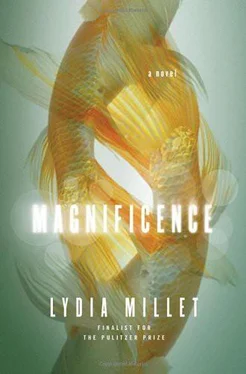When given the opportunity to see the body herself, Casey had shaken her head and said no, she preferred not to remember her father that way. Susan thought she was right, Susan was glad. But herself she had to see him, so she was going alone. They had insisted on laying him out formally in a private room. A young man in a gray suit escorted her to the door of the room and then left.
She went in with a feeling of duty, trying to carry herself well. The walls were a placid beige and there were flower arrangements on a sideboard and the cloying smell of a deodorizer: a bouquet called orange blossom, she suspected, or tangerine breeze or mango blush. Its chemical sweetness conjured industrial parks along the Jersey Turnpike where scents were manufactured for cosmetics, malls, fast food. And here was the coffin, its lid propped up to show a white satiny liner. She approached with her breath held — half-frightened, she realized, her hands shaking. She thought of crime shows on TV, procedurals with all manner of corpses. They used real actors first, then dummies for the grisly autopsy scenes — she recalled a bright crimson, the flaps of chests spread out like butterfly wings. Her parents had died and she had never seen them; Hal’s mother and father had died too, years since, and she had not seen their bodies either.
There he was.
She had expected waxy and limp — that was her expectation — but he was not. Like T. he was tanned, and his graying hair had lightened to blond at the temples. What shocked her was how good he looked — better than the last time she’d seen him alive. He almost looked young again. And it wasn’t makeup but the effect of real sun. With the contrast of light hair against the bronze skin he looked, in fact, healthy.
Briefly she entertained the notion of laughing. But the room was airless and resisted sound.
On the other hand, it might not be Hal at all. Where was Hal? This was a dummy, after all — the real actor was gone. They’d dressed it in a suit and tie, a dark suit she’d never seen before and a discreet tie over a white shirt. T. must have bought it and brought it to them. He had not mentioned this. Maybe, on the other hand, the suit was one of T.’s own. She could check, if she dared to reach for the tags, touch the back of the dead, still neck. She knew T.’s size and she knew that if it was his it would have to be Prada or Armani, since that was all he owned. Or all he used to own before he appeared at LAX in the threadbare garb of a street person, with Hal as his luggage.
She stood there beside the casket. Particles of air were touching both of them, touching Hal’s skin and then her own. His skin wasn’t living, she knew that all too well, but maybe energy subsisted there. Maybe there was silent movement within, particles sweeping down over the planes of her cheeks, the streams, the rivers of atoms, sweeping down over all of her and sweeping over him. This was the last time they would share a space, the last time their skins would be close. After this they would always be separate, on and on past the end of time, until the sun burned out and everything dissolved. And yet even if they were apart from now on, there must be others like them, shadows or mimics, unconscious reflections. People were not unique, surely: there were no anomalies in nature, were there? Individuals were permutations of longing, moments, tendencies. They were variations. So other shades of Hal and her, their many versions, crossed each other’s paths elsewhere, crossed over and merged, their cells swimming among the billions. . Except for Casey. In Casey they were together. If Casey were to have children, if Casey could — possible, in theory; at least, no doctor had said otherwise — they would remain together there, the molecules of Hal and her, diminishing as time went on but never entirely gone.
Impossibly he was putting her to shame — complete, reposing there calmly while she was still amidst the chaos of growth and change, the mess of life, the stew and whirl of microorganisms. Although death too was disorderly, she conceded — simply delayed by chemicals as she stood here. Only the deathless were neat.
She thought of the stone biers of saints, of relics lying in state in ancient churches. They had seen one in Europe, a saint. Oh not the saint, but his image — graven in stone while his bones lay beneath. The church had been built over his dead body. Where was it? France? A church built over the laid-out saint, to house his sanctified remains. After you left that ancient church, in retrospect, you somehow confused the two, you thought the saint was in the stone — the saint was the figure itself, its contours smooth and pristine. A stone man, a stone virgin: people were always less beautiful than the images of them.
Hal was not stone. No one would build a church to him.
But everyone deserved a church, she thought, feeling naïve, feeling twelve again: all the tragic heroes that were dead men, once infants — each hobbled soul that wished and was undone. Maybe that was how someone had thought of mausoleums. Personal churches, skyward-pointing buildings. There were whole cemeteries of them. In some places it had to do with flooding, she knew, low cities like New Orleans or Buenos Aires, but here at Forest Lawn the mausoleums appeared ostentatious, the opposite of holy.
It was in the lying-down figure of a man that holiness arrived. If a saint were interred standing up, his stone image vertical like a statue, there would be no grace in that. A man had to be lying down or he was not even an offering.
She had tears on her cheeks, felt the wet streaks cool the skin, but did not feel them in her eyes. She wondered how she had missed her own crying.
Hal had not given himself up, but someone else had offered him. The thieves, she thought at first, but they were only a proximate cause: the root cause was still and always her. The death might technically be a random event, sure, but she couldn’t stop there, the shape of her responsibility was too clear. She felt the struggle of trying to make death describe a single point, mean one thing that could be understood, but at the same time she knew she was spinning a tale out of physics, out of atoms. A bus lurching to a stop, a tree branch swaying and bobbing in the moving air, why, that was all that death was — a shifting of microscopic parts through time. The parts shifted and left you alone.
Hal might look good now but he would not stay good for long. From now on he was the property of the dirt and the water beneath the surface, the property of gnarled tree roots, grasses and microbes, larvae and slugs, rats, beetles, putrefaction, fermentation and dry decay. That was the allure of cremation, of course: when you thought of your body in future time you did not have to see it decomposing. Better to see yourself as ashes, ashes and rising smoke. But she had never liked ovens either. They had it right in India, where they wrapped them in white and lifted them onto pyres.
Hal had been good. Good friend, kind father and kind man.
And yet she had to think of herself. She always went back to her. Not even this dedicated moment could be selfless. Damn it! You had to see yourself there, where the loved one was, you couldn’t help it: because finally you too would be forced out, would have to let it all go. Finally she would be a dummy in someone else’s eyes, the living would look upon her from above. She would cease to be and join him , as was said. Join him in the sense of not joining him at all, in the sense of a parallel but utterly separate annihilation; join him in the sense of an eternal nonexistence that contained nothing.
Still they said join , they said join as though there was a throng there waiting, because that was their desperate hope, there was a throng there waiting with arms spread wide to embrace you — there they all were, all the ones you had known, cavorting on the alpine meadows green in stately, shining ballrooms.
Читать дальше












